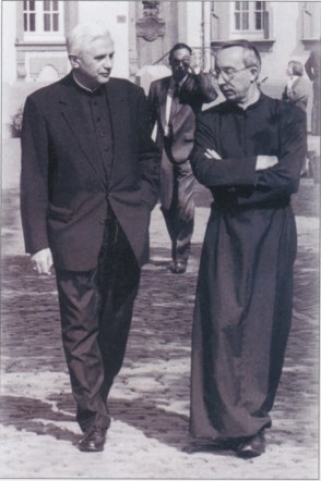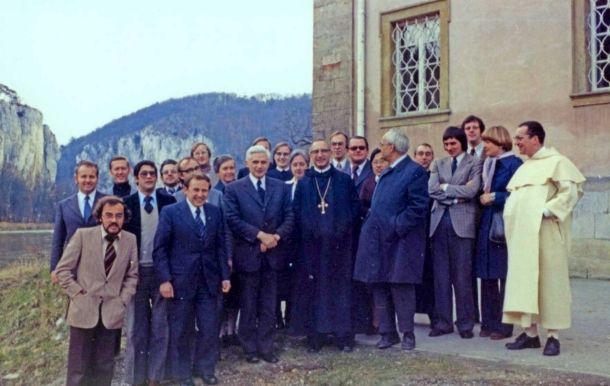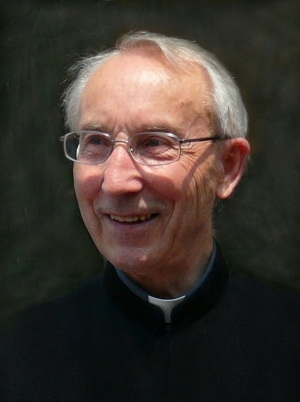Vatican City, 20th December 2014 – There are things that change your life. That is what happened to father Stephan Otto Horn, salvatorian priest, when he met Prof. Joseph Ratzinger for the first time, in 1970, before Ratzinger became “father of a theological and spiritual family”.
Father Horn was a student and assistant of Ratzinger in Regensburg and today he keeps the works and the thought of the Pope emeritus through his commitment in the institutions that have his name. He defines his meeting with Cardinal Ratzinger and his entrance in the Association of Students as “one of the greatest gift I have ever received”.
In this interview we proposed to our readers at Christmas time, Father Horn, professor emeritus of Fundamental Theology, recalls his experience at the University and the birth of the Schülerkreis and he reflects upon the theological inheritance left by Benedict XVI.
Father Horn, how did you meet Prof. Ratzinger?
I studied in Passau, a beautiful city at the border with Austria, where the salvatorians - the congregation I joined - used to study. My professor of Dogmatic Theology thought that I could be his successor... When I went to Regensburg to meet Prof. Ratzinger for the first time, he didn’t know that, in Munich, I had been a Ph.D student of Michael Schmaus, who had opposed Ratzinger’s teaching qualification. That period was by far one of the worst moments in the life of the young Ratzinger, because he had always wished to become a professor. Then he was successful with his career and he recovered his relationship with Schmaus. When I met Ratzinger, I didn’t know anything about it, I went to him and we spoke about my thesis.
Which year was that?
It was the beginning of 1970. He had arrived in Regensburg in autumn, 1969. He welcomed me without any problem, though I came from a different theology. The same happened to the 25 students that wanted him to be their supervisor. We used to meet him every two or three weeks, not at the university but in the seminary, and we defined him as the symbol of theology and spirituality. Our meeting started with the Mass, during which our teacher or one of us made the homily. After the Mass we usually discussed altogether. He wanted to follow us with our work; during our meetings each of us presented his study and we had the possibility to discuss about them all together. When we wanted to propose something, Ratzinger didn’t use to answer immediately. He was able to summarize our speeches and he also made some reflections on them. He didn’t want to impose his ideas, he only wanted to search for the truth. He has always been a bit shy, but he didn’t show it.
Which was the theme of your thesis?
The aim of my thesis for the teaching qualification at the university was to analyse the theme of Leo The Great and the Council of Chalcedon from the ecclesiological point of view and the relationship between the successor of Peter and the Council. I investigated a historical event, but also the relationship between Rome and Constantinople and between the East and the Church, that are ecumenical themes. The Council of Chalcedon showed that the thought of Peter’s successor was shared by the other bishops that participated in the Council. This is a historical theme, but it is also useful to foster the dialogue between Catholic Church and orthodoxy.
What did you do after your teaching qualification?
Two years after our first meeting, Prof. Ratzinger asked me to become his assistant, and I worked for him from 1972 to 1977, when he came back to Munich as an archbishop. I stayed there for a small period and he sometimes came in order to follow his last Ph.D. students. Then the yearly meeting of the Schülerkreis, the Association of Students, started.
Was the Schülerkreis born then?
No, it was born later, in 1981, at the end of Ratzinger’s ministry as a cardinal archbishop of Munich. It is difficult to find the exact date because there were the meetings with the Ph.D. students before. At the beginning of 1978, months after his Episcopal ordination and after he was nominated cardinal, we all met. He met not only the Ph.D. students of Regensburg, but also the ones from Bonn, Münster and Tubingen, because he had a different group in every university where he had taught. That was the first time, then we started meeting regularly. However, first in Tubingen and then in Regensburg, Ratzinger organized a meeting with his students and another professor and with famous theologians as Hans Urs von Balthasar and Karl Barth. At the end of every academic year a meeting was organized in a different place. He used to invite a famous theologian to hold a conference, with the aim to discuss with protestant professors, philosophers...From this experience new meetings with him have been organized. A professor was always invited and every time we used to pray, study and discuss on a different subject.
How many Ph.D. students were there in 1978?
In Regensburg we were about 25 Ph.D. students and students for the teaching qualification. When the Schülerkreis was born we were more than 50.



